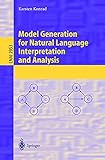Model Generation for Natural Language Interpretation and Analysis [electronic resource] /
Material type: TextSeries: Lecture Notes in Artificial Intelligence ; 2953Publisher: Berlin, Heidelberg : Springer Berlin Heidelberg : Imprint: Springer, 2004Edition: 1st ed. 2004Description: XIV, 174 p. online resourceContent type:
TextSeries: Lecture Notes in Artificial Intelligence ; 2953Publisher: Berlin, Heidelberg : Springer Berlin Heidelberg : Imprint: Springer, 2004Edition: 1st ed. 2004Description: XIV, 174 p. online resourceContent type: - text
- computer
- online resource
- 9783540246404
- 006.35 23
- QA76.9.N38
1 Motivation -- 1 Motivation -- I Logics -- 2 Model Generation -- 3 Higher-Order Model Generation -- 4 Minimal Model Generation -- II Linguistics -- 5 The Analysis of Definites -- 6 Reciprocity -- 7 Abduction -- 8 Implementation -- 9 Conclusion -- A Some Example Problems -- References and Index.
Mathematical theorem proving has undergone an impressive development during the last two decades, resulting in a variety of powerful systems for applications in mathematical deduction and knowledge processing. Natural language processing has become a topic of outstanding relevance in information technology, mainly due to the explosive growth of the Web, where by far the largest part of information is encoded in natural language documents. This monograph focuses on the development of inference tools tailored to applications in natural language processing by demonstrating how the model generation paradigm can be used as a framework for the support of specific tasks in natural language interpretation and natural language based inference in a natural way. The book appears at a pivotal moment, when much attention is being paid to the task of adding a semantic layer to the Web, and representation and processing of natural language based semantic information pops up as a primary requirement for further technological progress.


There are no comments on this title.